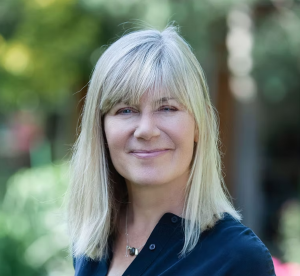June’s blog at SIETAR UK features an interview with our President, Cathy Wellings, and she kindly shares with us how she entered the field and where she sees the future of SIETAR UK as an organisation. Curiosity is at the root of many of our interculturalist stories and with Cathy it started at an early age. We asked Cathy about her journey.
Where did it all start for you? What attracted you to this field?
I have always been intrigued by what makes people tick and I had a desire to travel and work internationally from a young age. It may date me, but as a teenager, I had penfriends all around Europe and was able to travel and meet some of them in person. One summer, I spent a few weeks in Helsinki where I learnt how to communicate with my friend’s parents who spoke no English, and I discovered the pleasures of sauna culture for the first time.
I went on to study languages and taught English in Spain for five years. Some years later, I joined a language training consultancy that was just beginning to offer cultural awareness training to existing clients. I don’t think I even knew the word intercultural at that point, but part of my job was to manage the network of intercultural trainers and the programmes they delivered. During my interview, I found I was able to talk about the need to go beyond national stereotypes as I had lived in the Ile de la Réunion in France and Catalunya in Spain.
My role expanded as our expertise grew and we developed our product offering. I was fortunate to consult with some fantastic organisations across the globe and to work with – and learn from – many amazing trainers. I was always a little envious of the trainers who were out there doing it, working with clients on the ground and I started to co-facilitate or run short demo sessions for prospective clients. Finally, five years ago, I set up on my own and now work full-time as a trainer and consultant. I enjoy the variety that each week brings, working with different clients with different needs, and I love the fact that I am always learning from my clients.
How long have you been a member of SIETAR and how has it served you as a professional organisation?
I think I joined SIETAR UK in 2004 as a corporate member, so it’s been a while! SIETAR has been an invaluable source of continuous learning and development for me throughout my career; I have listened to some of the great names in our field, learnt about new tools and methodologies, and heard the latest research from rising stars in the SIETAR community. When I worked in training consultancies, SIETAR was a great source of new trainers, and even better, I could watch them in action presenting at events. I’m now an individual member and SIETAR provides me with a wonderful network: my professional family! And having been around a long time now, an added bonus is that I count many SIETARians as good friends!
What advice would you give new interculturalists starting out their careers in this field?
If you are considering working as an intercultural trainer or coach, my advice would be to make sure you have plenty of experience before you jump in. Work in a corporate environment say in HR or L&D, try a role in a specialist training company or volunteer overseas. It’s also important to focus on your training and facilitation skills as well as the subject matter itself. Having a master’s in intercultural communication in itself won’t make you a great trainer; a lot of our work is about facilitating good conversations as much as imparting knowledge. Finally, I would suggest being clear about the business model you will use; what type of clients you want to work with, how you will find them and the specific expertise you will share with them.
How necessary do you think it is to have international business experience when working as a trainer or coach in the field?
My view is that we need to be able to speak our clients’ ‘language’ and understand their pain points so if you want to work in the corporate environment, international business experience will help you to understand the system they operate in, to empathise with their challenges and it will also help you to build your credibility. I often work with university staff, and decision-makers are keener to know that I understand how universities work and the current challenges facing the higher education sector or if I’ve taught international students.
Getting involved in volunteer-led organisations like SIETAR, working on remote global projects or supporting overseas students at your university or expatriates in your organisation are great ways of gaining international exposure without packing your bags and jumping on a plane.
It’s also about being able to share authentic stories and build meaningful case studies and activities for your clients, so having ‘been there and done it’, whatever that looks like for clients and organisations you want to work with is important. I had a manager years ago who used to tell clients that our trainers ‘had dirt under their fingernails’, i.e. the trainers had lived experience of the clients’ reality.
How do you see the future of SIETAR UK?
The world is rapidly changing; our work feels more important than ever, but we need to recognise that perhaps a different type of work is required to what we were offering 15 or even 5 years ago. The intercultural field has started to broaden its perspective and build synergies with other disciplines such as sustainability and equity, diversity and inclusion. As a membership organisation, we need to stay relevant and reflect these changes in the field. I would like to see us expand beyond a core focus on intercultural training in the corporate world to work more closely with researchers and to include more varied perspectives so that we can support the wider community: for example, those working in health and social care, schools or the charity sector. Our RAAS project is a great example of this. Our membership is growing, but to keep relevant, we need to diversify our membership and appeal to new members from a wide range of backgrounds, disciplines and ages.
Bio
Cathy’s intercultural career has been divided between working as a senior manager in training consultancies and as an independent trainer working with individuals and teams within corporate and higher education organisations. She has lived and worked in France and Spain and managed training projects across the globe. She has been a member of SIETAR for over 20 years and is the current president of SIETAR UK.


